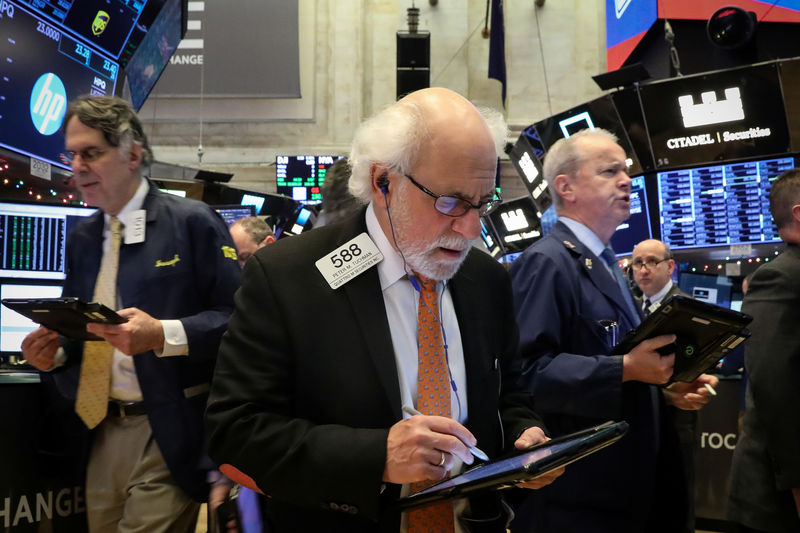By Shreyashi Sanyal
(Reuters) - Banks led Wall Street lower on Tuesday, as a decline in U.S. bond yields set off warning lights about slowing growth, while industrial and technology stocks fell on skepticism over the chances of a breakthrough in the U.S.-China trade talks.
Following a rally on Monday after Washington and Beijing agreed to a three-month truce to iron out their trade differences, the three major indexes pulled back about 0.8 percent as some U.S. Treasury yields inverted.
The curve between three-year and five-year Treasury notes and between two-year and five-year notes inverted on Monday — the first parts of the Treasury yield curve to invert since the financial crisis, excluding very short-dated debt. [US/]
Analysts expect the two-year, 10-year yield curve — seen as a possible precursor to a recession — to follow suit. The spread has already narrowed to its lowest in over a decade.
"While interest rate hikes have sent short-dated yields higher, tepid inflation and slowing economic growth expectations have kept longer-dated yields pinned down," said Michael O'Rourke, chief market strategist at JonesTrading in Greenwich, Connecticut.
"It's a signal we're getting closer to (full) inversion but we're still a fair distance from it. It's something to note ... something to be aware of but there're other facts in play."
The KBW Bank index (BKX) slid 2.83 percent, with Bank of America Corp (N:BAC) and Citigroup Inc (N:C) dropping about 3 percent each. The overall S&P financial sector (SPSY) dropped 2.13 percent.
The S&P technology sector (SPLRCT) fell 1.13 percent, while industrials (SPLRCI) dropped 1.98 percent. Both sectors tend to react the most to trade news and led the market's gains on Monday after the Sino-U.S. trade truce.
However, confusion over when the 90-day period starts and U.S. Trade Representative Robert Lighthizer, a China trade hawk, leading the talks fanned doubts if an actual resolution could be reached.
"Right now it's a bearish sentiment. As soon as investors digested the information from the discussions, they focused on the uncertainties and lack of details," Ryan Nauman, market strategist at Informa Financial Intelligence in Zephyr Cove, Nevada said.
Trade bellwethers Boeing Co (N:BA) and Caterpillar Inc (N:CAT) weighed the most on the Dow, while Apple Inc (O:AAPL), one of Monday's leaders, pressured the S&P and the Nasdaq.
Apple dropped 2.1 percent as supplier Cirrus Logic Inc (O:CRUS) trimmed its revenue outlook, adding to growing evidence of tepid iPhones sales.
At 11:30 a.m. ET the Dow Jones Industrial Average (DJI) was down 206.86 points, or 0.80 percent, at 25,619.57, the S&P 500 (SPX) was down 0.81 percent, at 2,767.66 and the Nasdaq Composite (IXIC) was down 0.98 percent, at 7,368.41.
Luxury home builder Toll Brothers Inc (N:TOL) dropped 2 percent and weighed on its peers after reporting its first fall in orders in over four years due to higher interest rates and home prices.
Declining issues outnumbered advancers for a 2.26-to-1 ratio on the NYSE and a 2.44-to-1 ratio on the Nasdaq.
The S&P index recorded 37 new 52-week highs and five new lows, while the Nasdaq recorded 34 new highs and 70 new lows.

The U.S. stock and bond markets will be closed on Wednesday to mourn the death of former U.S. President George H.W. Bush.